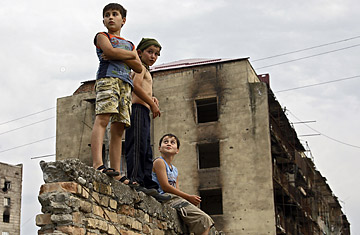
Children play on Aug. 3, 2009, near buildings destroyed a year earlier during a Georgian assault in Tskhinvali, regional capital of Georgia's breakaway province of South Ossetia
Just days before the one-year anniversary of last summer's war between Russia and Georgia, tensions between the two countries have escalated to the point where observers are worried they could break out into another full-scale conflict. As both sides accuse the other of attacks and provocations, it seems the fragile peace established after five days of fighting in August 2008 is at risk.
After claims by Russia over the weekend that Georgia had lobbed mortars over the border into South Ossetia, Georgia's Foreign Ministry on Monday accused Russia of setting up new border posts inside undisputed Georgian territory. Calling the move "extremely alarming," the Ministry said the incident — which allegedly happened on Sunday near the village of Kveshi, between the South Ossetian capital of Tskhinvali and Gori, Georgia's second largest city — was an "attempt by the Russian occupants to penetrate into the depth of Georgian territory."
For its part, Russia is accusing Georgia of planning aggressive action in the run-up to the war's anniversary on Aug. 7. "The Georgian leadership is plotting various events on the border with South Ossetia to coincide with the anniversary of the 2008 events in the Caucasus ... They are of a distinctly provocative nature," Deputy Foreign Minister Grigory Karasin said on Wednesday, according to Russian news agency Itar-Tass.
Anatoly Nogovitsyn, the deputy chief of staff of Russia's armed forces, made it clear that the country is willing to fight again if it feels it has been provoked. "As a military man, I will be direct," he said at a news conference on Tuesday after the Russian army increased the combat readiness of troops in South Ossetia. "If there is aggression, there will be an adequate response."
On Aug. 7, 2008, Georgian forces launched an early-morning assault on South Ossetia after days of clashes between Moscow and Tbilisi over the fate of the breakaway republic and that of Abkhazia, another republic that had declared independence from Georgia following wars in the early 1990s. Hours after the attack, Russia responded with what the West condemned as a "disproportionate" use of force. Within five days, Russian forces had driven Georgian troops out of South Ossetia and into central Georgia. During the war, international human-rights groups accused Georgia of indiscriminately shelling civilian areas and Russia of allowing the ethnic cleansing of Georgian villages in South Ossetia. Though the fighting failed to topple the ailing presidency of Georgian President Mikheil Saakashvili, one of the Kremlin's archenemies, his power inside the country was weakened. Street protests against him have only recently come to an end. The war also strained Russia's relations with the West — relations that U.S. President Barack Obama was trying to reset on his recent visit to Moscow.
A year on, buildings throughout the South Ossetian capital of Tskhinvali, where the majority of the fighting took place, remain demolished, and thousands of people are still displaced on both sides of the border. Russia has pledged $640 million in aid for reconstruction, while Tbilisi owes $4.5 billion to the West in postwar aid and loans. Since the end of the war, 240 unarmed European Union monitors have been patrolling the border on the Georgian side to ensure that the terms of the cease-fire brokered by French President Nicolas Sarkozy are not broken. But they have not been given access to the Russian-patrolled South Ossetian side of the border and so cannot confirm the reported provocations or back up any of the accusations Russia and Georgia are leveling at each other.
Whether or not it turns out to be justified, Russia and Georgia's blame game could have tragic consequences. During his recent visit to Tbilisi, U.S. Vice President Joe Biden stressed that "there is no military option to [South Ossetia and Abkhazia's] reintegration [into Georgia]," and according to Georgian National Security Council Secretary Eka Tkeshelashvili, Biden told him that the U.S. is now carrying out "preventive diplomacy so the situation does not deteriorate." But if what Russian Deputy Foreign Minister Karasin said on Wednesday is true and "no one can give us any guarantee that there will not be new aggression from Georgia," then the situation may have already deteriorated too far.
